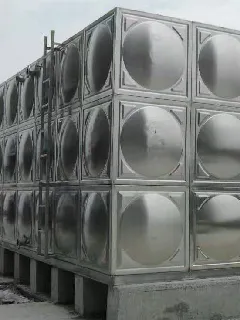loading...
- No. 9, Xingyuan South Street, Dongwaihuan Road, Zaoqiang County, Hengshui, Hebei, China
- admin@zjcomposites.com
- +86 15097380338
- Welcome to visit our website!
fiberglass tank
Fiberglass tanks have become an increasingly popular choice for a variety of applications due to their unique properties and advantages. Composed of a combination of glass fibers and resin, these tanks offer notable strength, durability, and resistance to corrosion, making them ideal for storage and processing in industries such as chemical, agricultural, and wastewater.
One of the primary benefits of fiberglass tanks is their resistance to a wide range of chemicals. Unlike traditional metal tanks that may corrode over time when exposed to harsh substances, fiberglass tanks maintain their integrity, ensuring safe and reliable storage of liquids. This characteristic is particularly important in industrial settings where the storage of corrosive chemicals is necessary.
Moreover, fiberglass tanks are lightweight compared to their metal counterparts. This reduced weight not only makes them easier to transport and install but also minimizes the structural load on supporting foundations. As a result, fiberglass tanks can be installed in locations that may not support heavier systems, expanding their usability across various sites.
The versatility of fiberglass tanks extends to their design and customization. These tanks can be manufactured in various shapes, sizes, and configurations to meet specific needs. Whether for above-ground or underground use, fiberglass tanks can be tailored to accommodate different storage volumes and environmental conditions. This customization is especially beneficial for industries that require specialized storage solutions.
fiberglass tank

In addition to their functional advantages, fiberglass tanks are designed to have a long lifespan, often lasting several decades with proper maintenance. This durability translates to lower replacement costs over time and reduced environmental impact, as fewer tanks will need to be produced and disposed of.
Furthermore, fiberglass tanks can be equipped with advanced monitoring systems to track liquid levels and detect potential leaks. This technology enhances safety measures, ensuring that any issues are addressed promptly, thus protecting the environment and the facility's operations.
In conclusion, fiberglass tanks are a superior solution for many storage needs due to their strength, chemical resistance, lightweight nature, and longevity. Their adaptability to various applications makes them an invaluable asset across multiple industries, providing efficient and effective solutions for liquid storage. As industries continue to prioritize safety and sustainability, the adoption of fiberglass tanks is likely to grow, paving the way for more innovative applications in the future.
-
The Rise of FRP Profiles: Strong, Lightweight, and Built to LastNewsJul.14,2025
-
SMC Panel Tanks: A Modern Water Storage Solution for All EnvironmentsNewsJul.14,2025
-
GRP Grating: A Modern Solution for Safe and Durable Access SystemsNewsJul.14,2025
-
Galvanized Steel Water Tanks: Durable, Reliable, and Ready for UseNewsJul.14,2025
-
FRP Mini Mesh Grating: The Safer, Smarter Flooring SolutionNewsJul.14,2025
-
Exploring FRP Vessels: Durable Solutions for Modern Fluid HandlingNewsJul.14,2025
-
GRP Structures: The Future of Lightweight, High-Performance EngineeringNewsJun.20,2025
